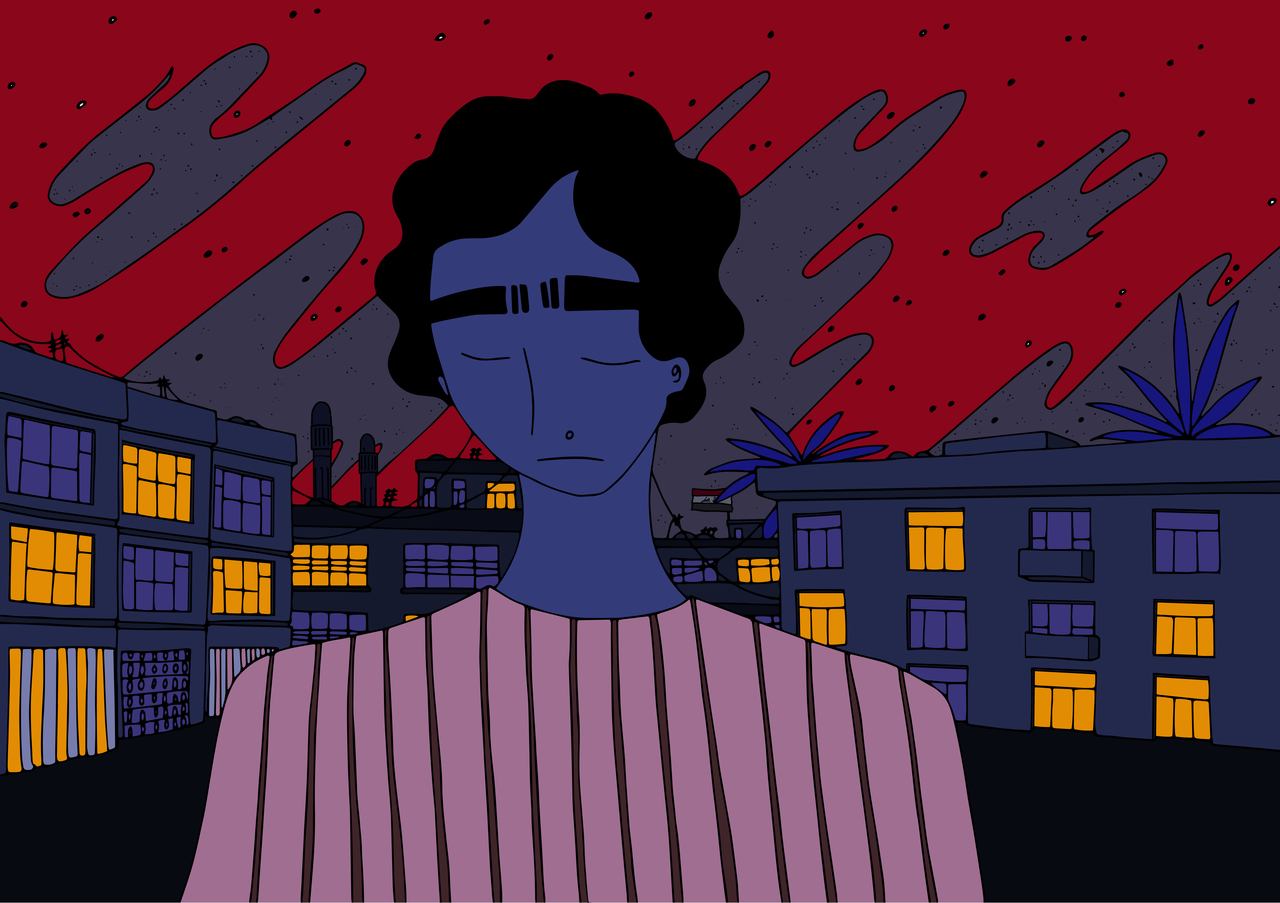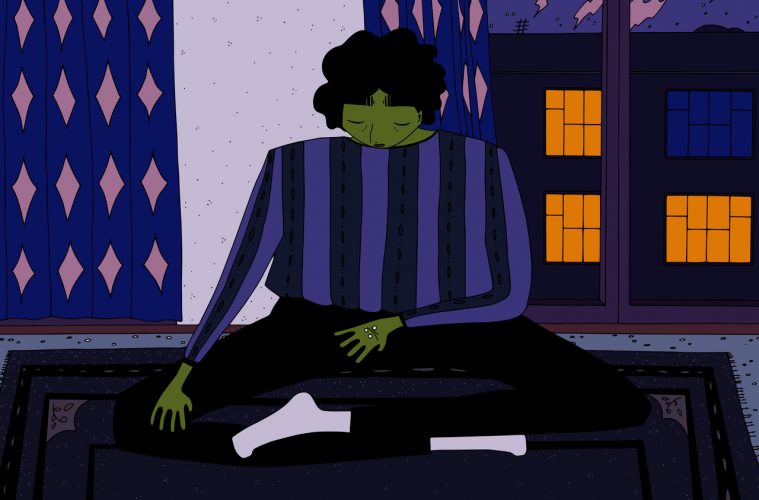Written by Shousha
Artwork by Aude Nasr
This piece is from issue ’69’ – (here)
This is the story of Omar*, a 31-year-old Iraqi man who has AIDS. Omar is from a middle-class background, and is currently living in Baghdad. Below, he will tell his story of his childhood, his diagnosis, the struggle to find treatment and support, and how societal discrimination bleeds into exploitation in medical contexts. His story sheds light on the challenges that many in the region face.
What was your childhood like? Could you describe your life for us before your diagnosis?
I was like any other child; I loved life and raising pets. My life was good, no problems or struggles. I was happy with my studies and my friends and family. However, my family went through a difficult financial situation that forced me to drop out of school and work as a salesperson at a store that sold women’s clothing.
Life went on as normal, and after a while I left work because of my uncle’s health problems. I traveled with him abroad to help him while he got an operation done because of his cancer. He needed care he couldn’t get in Iraq. I stayed with him for three months. The operation was successful, but a very short while after we arrived back in Iraq, his health deteriorated again and he became bedridden. I became his sole caretaker and the person who took care of all his affairs until he passed away in 2014.
After, my life took a turn for the worse afterward. Problems with my family grew and my mental health deteriorated, so I left Iraq to go live in Turkey. I lived with a few young men and was happy with my new life.
How did you learn that you were HIV positive?
After living in Turkey for a year, I learned that my father’s health was declining. I returned to Iraq. My father passed, and when he did, my responsibilities grew considerably. I held many different jobs to be able to earn a living for my family and siblings.
Despite these challenges, I complained of nothing. After a while, I started to notice pain in my lower back, and I found out I had a fistula after seeing a doctor. I had an operation done and the pain went away, but two days later, it returned stronger than ever.
I went to another doctor and got comprehensive lab tests done, including a test that screened for HIV. It was through these tests that I learned I was HIV positive. I was in shock and didn’t tell anyone at first. When my mother eventually found out, she tried to give me advice and keep my spirits up.
It was then that I started going to specialized clinics to learn about my options, and I was surprised to learn that there was a treatment and that there were many HIV positive people around the world who are able to lead normal lives.
“Haven’t doctors taken an oath to provide medical services to those who need them unconditionally? Is it not a shame that doctors ask for additional fees from patients in order to agree to operate on someone with HIV?”

Artwork by Aude Nasr
Are there healthcare services for people with HIV in Iraq?
Things are different in Iraq. There is no medicine or even the necessary lab tests to assess and treat HIV, such as the viral load test and immunity tests. Some private clinics offer some of the necessary tests, but the prices are very high and the care patients receive is very bad. I actually stopped looking for and visiting private clinics, and simply waited to receive treatment for HIV while also managing the pain of the fistula, which required an operation to treat.
How do doctors react when they learn about your disease?
When doctors learn that I’m HIV positive, they refuse to help me. Some agree to help, but asked for astronomical amounts of money to operate on me. Some ask me to buy medical equipment and tools for them. After searching for two months, I couldn’t find anyone to perform the operation for my fistula.
I then reached out to a doctor in Turkey who agreed to do the operation. I managed to come up with the required amount of money and had the operation in Turkey, and continued to seek out treatment for HIV once returning to Iraq. I even asked for help from a friend in the USA, telling him about my situation and my test results, but he cut me off completely when he learned I was HIV positive.
Have you told any of your other close friends?
I couldn’t tell anyone because of how society viewed my disease. I feared that people would gossip and wanted to protect my family. I let matters be because there was nothing I could do: there was no way to receive treatment in Iraq, and I couldn’t travel abroad to buy the treatment or run tests. I’ve been living with this disease since 2017.
What is the ideal next step?
I hope to be able to receive treatment. I want my condition to improve and to stay alive. I need someone to help me travel abroad to receive the necessary treatment and care, because in Iraq, the state of healthcare is in ruins and patients are taken advantage of and asked for exorbitant amounts of money in order to get the most basic of healthcare.
Do you think it’s acceptable for a doctor to refuse to operate on a patient who is HIV positive?
Doctors should know and be completely aware so they can protect themselves from the disease, but also know that it is relatively simple to keep themselves safe. Haven’t doctors taken an oath to provide medical services to those who need them unconditionally? Is it not a shame that doctors ask for additional fees from patients in order to agree to operate on someone with HIV? Isn’t it a shame that they’ve turned medicine into a business and take advantage of people? And here then remains the main problem, which is the unavailability of medicine and treatment for those who are HIV positive in Iraq, and that is what puts the entire Iraqi people at risk.

